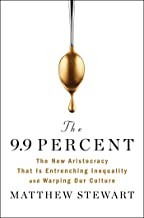I usually don't talk about the books I read, mostly because they're not worth talking about -- mysteries and thrillers by Michael Connelly, Robert Crais, Tana French, Louise Penny. I just started Y Is for Yesterday, the last book by Sue Grafton.
But I recently read two interesting nonfiction books mentioned in the NY Times book review. They both basically blame all the economic ills of our country not on the super-rich, but on the upper middle class. Not the top 1%, but the other top 9% -- the doctors, lawyers, professors, accountants and faceless administrators and bureaucrats who run our government-regulated capitalistic society.
These are the people who believe in our merit-based economic system. They credit their success to talent, education and hard work. But according to these authors, this professional class consists for the most part of people (as was said of George Bush) who were born on third base and think they hit a triple.
There's just enough truth to their view that it makes sense . . . to them. It does take a good education and marketable skills to get ahead in our world. But much of their success has less to do with hard work, and more to do with winning the lottery of birth. Most are born to rich, educated parents. They benefit from an enriched childhood, good suburban public schools (or private schools), a ticket to a good college, and maybe even a leg up to find that cushy well-paying job.

Just one example. A prized experience many job interviewers look for these days is an internship. It shows interest, dedication, knowledge. Many internships are unpaid. Who can afford to spend months working an unpaid internship? The children of the upper middle class. And how do you get one of those prized internships? Sure, some are broadcast to the public and can be applied for on an even basis. But many are posted on the bulletin boards of those exclusive colleges, or heard about from a vice president who lives in the McMansion down the street.
Just so you know, the median individual income in the U. S. today is about $44,000 per year. (It depends where you live. The average is about $35,000 in Mississippi or New Mexico, but $55,000 in Maryland or Massachusetts.) To be in the top 10% of earners, you need to make about $110,000 a year as an individual, or over $200,000 in household income. (If you live in Maryland or Massachusetts you need more than $280,000 to reach the top 10%!)
Why so much more as a household? Blame it on what the authors call "assortive mating." College graduates tend to marry other college graduates, and since college graduates make more money than those who don't go to college, these households have comparatively more income. When lawyers marry other lawyers, or financial analysts marry other financial analysts, the cycle of inequality just gets worse.
The authors are careful not to blame people who want to succeed, or parents who want their kids to get ahead. It's only natural. But as a class, that top 9% -- the upper middle class -- gets the lion's share of economic benefits, and thus perpetuates inequality. They're the ones who can afford to reap the tax benefits of IRAs and 401Ks, for example, while people on the bottom rungs of the economic ladder can't afford to take advantage of these retirement vehicles.
It's the upper middle class that rushes to open tax-advantaged 529 plans to fund their offsprings' college education -- making sure their children and grandchildren go to college and perhaps graduate school, to perpetuate their prized economic status into the next generation and beyond.
It's also the upper middle class that reaps the most rewards of home ownership. They get a tax deduction for mortgage and real-estate tax -- the more expensive the house, the more rewards they reap. And the expensive house gains them entry into a good local school system, easing the way for the kids to attend a private college or top state university.
There's a lot more to the story of how the upper middle class maintains its favored status, and why that's a problem for the rest of the country. If you want to know more, the first book is:
Dream Hoarders: How the American Upper Middle Class Is Leaving Everyone Else in the Dust by Richard Reeves.
The second one is: The 9.9 Percent: The New Aristocracy That Is Entrenching Inequality by Matthew Stewart.
I like the Reeves book better. It's shorter, more to the point, and seems more factual. I recommend it to anyone who's a member of the 9.9%, who resents the 9.9%, or who cares about how our economic society really works. To me, the Stewart book seems like more of a political rant. Besides, you can access his 2018 article in The Atlantic which will give you the bones of the book in a tenth of the time.
What . . . you thought when 2022 arrived there'd be no more homework?!?





